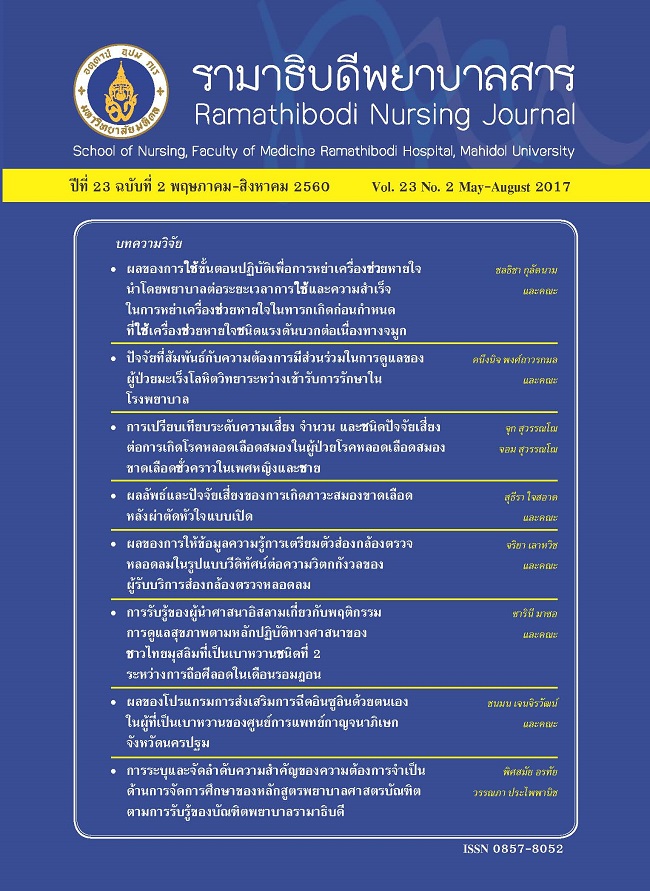Perception of Islamic Religious Leaders toward Religion- Related Health Behavior of Thai Muslims with Type 2 Diabetes Mellitus During the Fasting Month of Ramadan
Main Article Content
Abstract
Abstract
The purpose of this descriptive study was to explore the perception of Islamic religious
leaders toward religion-related health behavior of Thai Muslims with type 2 diabetes mellitus during the
fasting month of Ramadan. Kleinman’s Explanatory Model of Illness was used as the conceptual framework
for the study in combination with Muslim beliefs. The sample was selected by purposive sampling which
consisted of 40 Islamic religious leaders in Narathiwas Province, Thailand. Data were collected from
February to March 2015 through semi-structured interviews and audio recordings. The data obtained
were analyzed using descriptive statistics and content analysis.The findings revealed that most of the
Islamic religious leaders perceived fasting during Ramadan as a necessity to practice in compliance with
religious principles with no impact on health. However, the exception can be made for people with health
problems. Fasting during Ramadan is of benefit in controlling blood-glucose levels and maintaining inner
peace. The participants perceived that Thai Muslims with type 2 diabetes mellitus who fasted during
Ramadan should modify their dietary behavior in terms of the number, type, quantity, and pattern of meals
per day. Furthermore, the participants perceived that people in this group should modify their health
behavior in accordance with the practice of fasting during Ramadan, performing activities and exercising
less in line with their weakened physical conditions. In terms of health behavior, the participants thought
that people with diabetes need to take a particular care of oral hygiene and teeth, have health check-ups,
and blood glucose testing by appointment because these activities do not violate religious principles. As
for the roles of religious leaders, most participants held the view that religious leaders should participate
and support in the health care of Thai Muslims with diabetes who fast during Ramadan. In addition, they
report a need for training for their ability to offer consultation about fasting during Ramadan for Thai
Muslims with type 2 diabetes mellitus. These findings will enable health care providers understand the
perceptions of Islamic religious leaders about health behavior in compliance with the religious practices
of Thai Muslims with type 2 diabetes mellitus when fasting during Ramadan. Health care providers should
provide opportunities for religious leaders to exchange their opinions with them about the way of practices
of Muslims with diabetes mellitus. Therefore, they can mutually promote practices in compliance with
both Islamic religious principles and intervention plans of health care providers for culturally harmonious
health and well-being.
Keywords: Perception, Type 2 diabetes, Thai Muslims, Islamic religious leaders, Fasting month of Ramadan
Article Details
บทความ ข้อมูล เนื้อหา รูปภาพ ฯลฯ ที่ได้รับการตีพิมพ์ในรามาธิบดีพยาบาลสาร ถือเป็นลิขสิทธิ์ของวารสาร หากบุคคลหรือหน่วยงานใดต้องการนำทั้งหมดหรือส่วนหนึ่งส่วนใดไปเผยแพร่หรือเพื่อกระทำการใด ใด จะต้องได้รับอนุญาตเป็นลายลักษณ์อักษรจากรามาธิบดีพยาบาลสารก่อนเท่านั้น


